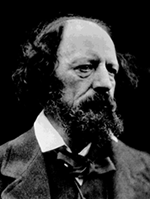August 6: Alfred Tennyson
Alfred, Lord Tennyson (1809)
It was on this date, August 6,* 1809, that Victorian English poet Alfred, first Baron Tennyson, was born at Somersby, Lincolnshire, the fourth of twelve children fathered by a clergyman. Commonly known as Alfred, Lord Tennyson, he wasn't a Lord until he at length accepted a baronetcy from Queen Victoria in 1884. Alfred began writing poetry at age 8. At Cambridge, he formed friendships with Edward FitzGerald and Arthur Henry Hallam. Tennyson took a poetry prize in 1829 by besting William Makepeace Thackeray. He and Thackeray became friends, anyway.
In 1830, Tennyson published a poetry collection called Poems, Chiefly Lyrical, which won him some critical notice, although its sequel, published three years later, received unfavorable reviews. It was that same year, on 15 September 1833, that Hallam died suddenly at the age of 22. Already reeling from bad reviews, the death of his closest friend sent Tennyson into a depression. Yet it was during this time that he began to compose one of his greatest works, "In Memoriam A.H.H.," dedicated to Arthur Henry Hallam. It included the lines:
I hold it true, whate'er befall;
I feel it, when I sorrow most;
'Tis better to have loved and lost
Than never to have loved at all.
In Memoriam would not be completed until 1850, the year that Tennyson succeeded William Wordsworth as Poet Laureate. In the intervening seventeen years, he had published another volume of poetry, including "Ulysses" and "Locksley Hall."
In many poems, Tennyson uses theistic language to express essentially Pantheistic views, which he shared with his college mates, FitzGerald, Hallam and Thackeray. It is commonly assumed that Tennyson was an orthodox believer, but there are strong reasons to conclude that he doubted immortality – his wife quotes him saying, "About a future life we know hardly anything"** – and rejected important Christian doctrines. The poet William Allingham, who knew him well, records Tennyson saying, "I believe in Pantheism of a sort," and in 1867 said he was "uncertain regarding the condition and destiny of man."†
His son's two-volume biography records that a few months before the poet died, he was cajoled into taking Communion. The religious press delightedly spread the story, leaving out only the part where Tennyson warned the clergyman that he did not accept that Christian doctrine.** His son also writes that shortly before his death, Tennyson said of Giordano Bruno, "His idea of God is in some ways mine."** Bruno, you may remember, had been burned at the stake for heresy.
Biblical scholar and translator Benjamin Jowett (c.1817-1893), in an Appendix to the son's biography, said Tennyson "was one of those who, though not an upholder of miracles, thought that the wonders of Heaven and Earth were never far absent from us."
In "Locksley Hall Sixty Years After" (1886) Tennyson wrote of morality divorced from revelation,
Follow you the Star that lights a desert pathway, yours or mine.
Forward, till you see the highest Human Nature is divine.
Follow Light, and do the Right – for man can half-control his doom –
Till you find the deathless Angel seated in the vacant tomb.
And even in "Crossing the Bar" (1889), the afterlife is more a wish than an expectation:
For though from out our bourne of Time and Place
The flood may bear me far,
I hope to see my Pilot face to face
When I have crossed the bar.
Alfred, Lord Tennyson, died at Aldworth on 6 October 1892 and was buried in the Poets' Corner in Westminster Abbey. It was Tennyson who said, "We have but faith: we cannot know; For knowledge is of things we see" (In Memoriam).
* Baptismal records say 5 August, but Tennyson's mother celebrated his birthday on her wedding anniversary, 6 August.
** Alfred, Lord Tennyson: a Memoir, by Hallam, second Baron Tennyson, 2 vols., 1897.
† William Allingham: A Diary, 1907. Allingham, a prominent English poet, lived 1824-1889.
Originally published August 2003 by Ronald Bruce Meyer.


